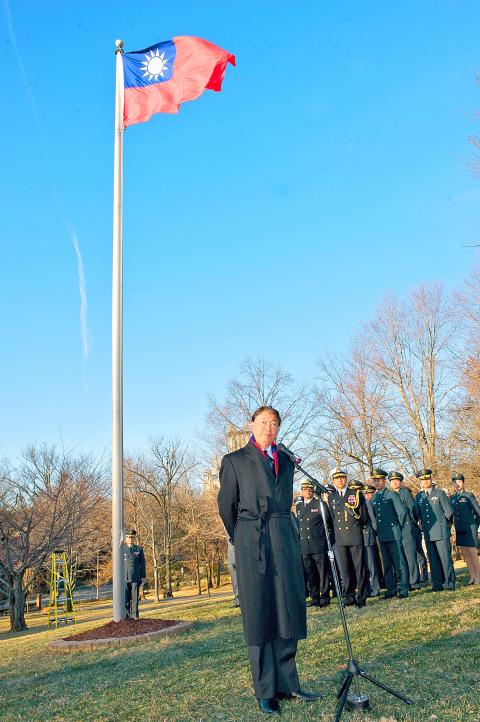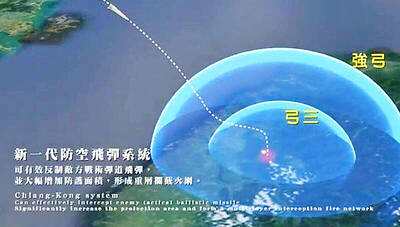Taiwan needs to “reset” its representation with the US, a former Congressional official said on Friday.
The move could ensure that the opportunity to strengthen bilateral ties is not lost this year, recently retired US Congressional Research Service specialist in Asian security affairs Shirley Kan said.
She called on President Ma Ying-jeou (馬英九) and the Legislative Yuan to lift the morale of Taiwan’s diplomatic service and “rejuvenate the ranks with younger officials.”

Photo: CNA
At a conference on US-Taiwan relations at the Heritage Foundation in Washington’s Kan said that the US’ trust in Taiwan had been hurt by a flag-raising ceremony at the Twin Oaks Estate in January.
There is an understanding between Taiwan and the US that for diplomatic reasons the Republic of China flag is not flown at Twin Oaks in Washington.
Without consulting officials in Taipei or Washington, Representative to the US Shen Lyu-shun (沈呂巡) raised the flag during a ceremony in January, upsetting Beijing and causing a diplomatic storm that continues to make waves.
It has been reported that senior US officials have requested that Taipei replace the representative.
Kan said that she was “concerned” about US policy toward Taiwan, adding that last month, US Assistant Secretary of State for East Asia Danny Russel said progress in cross-strait relations had strengthened the US-Taiwan relationship.
“I disagree,” Kan said.
She said that US engagement with Taiwan was based on the belief that strong US ties would give Taipei “confidence and strength” to engage with Beijing.
“There has been critical bipartisan support in Congress for Taiwan’s democracy, defense and participation in international organizations,” she said.
Kan said she told Washington not to interfere in Taiwan’s presidential and legislative elections next year, adding that last month, US Undersecretary of State for Political Affairs Wendy Sherman said that Taiwan was not talked about as much as it once was and that this was a good sign.
Kan said that the Taiwan Relations Act was the most important factor and that Taiwan continued to be “talked about a lot.”
“Taiwan is a beacon of democracy, including as a model for China,” Kan said. “There have been a number of important elements — substantive strengthening of ties to Taiwan — not just a relationship for the sake of a relationship.”
She said that the state visit to Washington later this year by Chinese President Xi Jinping (習近平) would “suck the oxygen from the room” and make it more difficult for Taiwan’s voice to be heard.
Kan said Taiwan must focus on military reforms and spend more on national defense.
Taipei should send top officials, including Minister of National Defense Kao Kuang-chi (高廣圻), to the US and elsewhere, she said.
“The ball is in Taiwan’s court,” Kan said.
She said that Ma’s East China Sea peace initiative must be followed with a South China Sea initiative, and that Taiwan should clarify its understanding of the “nine-dash line.”
Kan said that top officials from US President Barack Obama’s administration might make more opportunities to talk to Ma, “perhaps during visits to the US called transits or at international events.”
She also said the Obama administration needed to give a straight “yes or no” answer to Taiwan’s request for aid with its proposed submarine program.
“This is way overdue,” Kan said.

LIMITS: While China increases military pressure on Taiwan and expands its use of cognitive warfare, it is unwilling to target tech supply chains, the report said US and Taiwan military officials have warned that the Chinese People’s Liberation Army (PLA) could implement a blockade within “a matter of hours” and need only “minimal conversion time” prior to an attack on Taiwan, a report released on Tuesday by the US Senate’s China Economic and Security Review Commission said. “While there is no indication that China is planning an imminent attack, the United States and its allies and partners can no longer assume that a Taiwan contingency is a distant possibility for which they would have ample time to prepare,” it said. The commission made the comments in its annual

DETERMINATION: Beijing’s actions toward Tokyo have drawn international attention, but would likely bolster regional coordination and defense networks, the report said Japanese Prime Minister Sanae Takaichi’s administration is likely to prioritize security reforms and deterrence in the face of recent “hybrid” threats from China, the National Security Bureau (NSB) said. The bureau made the assessment in a written report to the Legislative Yuan ahead of an oral report and questions-and-answers session at the legislature’s Foreign Affairs and National Defense Committee tomorrow. The key points of Japan’s security reforms would be to reinforce security cooperation with the US, including enhancing defense deployment in the first island chain, pushing forward the integrated command and operations of the Japan Self-Defense Forces and US Forces Japan, as

‘TROUBLEMAKER’: Most countries believe that it is China — rather than Taiwan — that is undermining regional peace and stability with its coercive tactics, the president said China should restrain itself and refrain from being a troublemaker that sabotages peace and stability in the Indo-Pacific region, President William Lai (賴清德) said yesterday. Lai made the remarks after China Coast Guard vessels sailed into disputed waters off the Senkaku Islands — known as the Diaoyutai Islands (釣魚台) in Taiwan — following a remark Japanese Prime Minister Sanae Takaichi made regarding Taiwan. Takaichi during a parliamentary session on Nov. 7 said that a “Taiwan contingency” involving a Chinese naval blockade could qualify as a “survival-threatening situation” for Japan, and trigger Tokyo’s deployment of its military for defense. Asked about the escalating tensions

INTERCEPTION: The 30km test ceiling shows that the CSIST is capable of producing missiles that could stop inbound missiles as they re-enter the atmosphere Recent missile tests by the Chungshan Institute of Science and Technology (CSIST) show that Taiwan’s missiles are capable of intercepting ballistic missiles as they re-enter the atmosphere and pose a significant deterrent to Chinese missile threats, former Hsiung Feng III missile development project chief engineer Chang Cheng (張誠) said yesterday. The military-affiliated institute has been conducting missile tests, believed to be related to Project Chiang Kung (強弓) at Pingtung County’s Jiupeng Military Base, with many tests deviating from past practices of setting restriction zones at “unlimited” and instead clearly stating a 30.48km range, Chang said. “Unlimited” restrictions zones for missile tests is